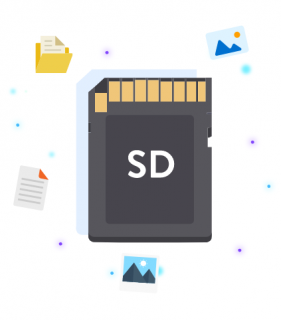You may wonder how to unformat SD card after accidentally formatting it. Keep reading to get some useful tips for retrieving lost data. AOMEI FastRecovery is the top choice to unformat SD cards easily and quickly.

How to Unformat SD card
Silly me, formatted the wrong SD card. I need to recover some important pics of it. Is there an effective solution to recover an accidentally formatted SD card? Thanks in advance.
- Questions from forums
Have you formatted your SD card incorrectly? In some cases, you may have formatted the SD card with a different file system to accommodate a different device.
Whatever the reason, the data on the SD card has been deleted! But the good news is that you can retrieve data after formatting and inherently unformat an SD card. This article is dedicated to showing you how to unformat an SD card using the 3 methods, both for Windows and Mac.

Yes, it is. Since SD cards are usually formatted using Quick Format, formatting will theoretically not permanently erase the data in them. There are tools you can use to perform format SD card recovery.
❗ The lost files on the SD card should not be overwritten or destroyed. Therefore, please stop writing any new data to the SD card as soon as it is formatted, or you cannot unformat the SD memory card or recover data from formatted SD card.
You can keep reading and learn about how to unformat SD card on a Windows and Mac.
2 useful methods are offered to unformat SD card on a Windows. If you are a PC professional or skilled with CMD to recover files, you can try Way 1.
For ordinary people, it is suggested to download the advanced data recovery software introduced in Way 2 to unformat SD cards and recover files from them at the highest rate.
You can make use of the built-in command prompt to unformat SD card. It’s worth a go even though it is not entirely successful. The following steps are how to use it.
Step 1. Connect your SD card to your computer with a compatible USB cable.
Step 2. Type Command Prompt in the Windows search bar and click Run as administrator.
Step 3. Type chkdsk #: /f (Replace # with the letter of the SD memory card that was formatted.) Press Enter to continue.
Step 4. Type the command ATTRIB -H -R -S /S D #: *.* (Replace # with the SD card drive letter) > Finally, press Enter.
Although it is one of the most often used methods, the command prompt is not the ideal approach to unformat an SD card because unformat was a discontinued command. Try the more successful approach below if this one fails.
To make the unformat process simple and efficient, you can rely on the Windows data recovery tool - AOMEI FastRecovery, which helps you unformat the SD drive and get your file back in three simple steps.
Free download and install the best software by clicking the icon below to unformat SD memory card in three simple steps.
Step 1. Connect your SD card to your computer with a compatible USB cable > Run AOMEI FastRecovery > Locate the SD card from the list > Click Scan to continue.
Step 2. Wait for the scanning process to finish. During the process, you can directly select the files from the Scanned files list to restore or wait for a full result.
At this step, you can sort the scanned files using the "Search for files or folders" box.
Besides, you can use different filters to narrow the range of search results to find your files quickly:
Step 3. Select the wanted or all files you want to recover > Click Recover x files to get them back to the SD card.
If you want to recover files from SD card on a Mac for free, choose the open-source application PhotoRec. It is used to recover lost files from hard disks, memory cards, and CD-ROMs. Although it has to use commands to recover files, it is very useful to unformat SD card on Mac for free.
Step 1. First, Download and install PhotoRec on your Mac. Then, connect the SD Card to your Mac with a card reader.
Step 2. Open the program and enter your user password to run PhotoRec.
Step 3. Select SD card from the disk list and press Enter to continue.
Step 4. Select the SD drive and press Enter to continue.
Step 5. Select file system and press Enter to continue.
Step 6. Then select the destination to save recovered files from your formatted SD card.
Data loss due to accidental formatting of an SD card can be a significant setback. To avoid such mishaps, consider these tips:
Hope the methods introduced in this guide can help you successfully unformat SD card without any data loss. What’s more, it is suggested to back up SD card to the computer in advance if the operation risks losing data. If this guide helps you, please share it with others.